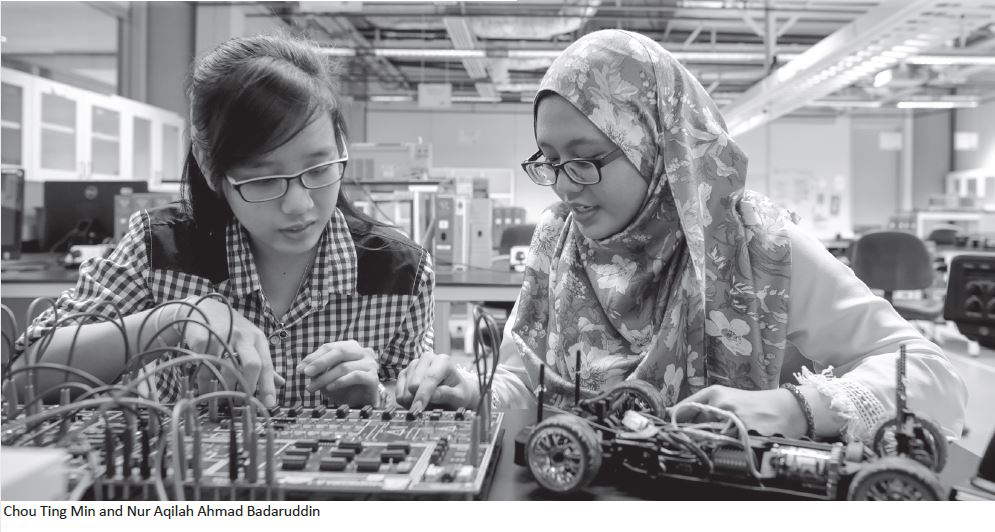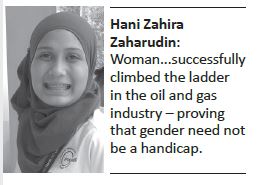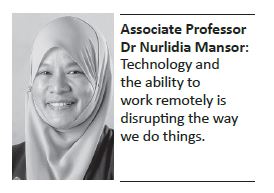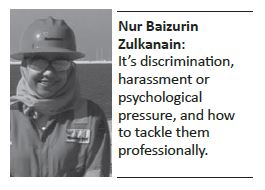Engineering Gender Diversity
[13 January 2019, The STAR]

Creating awareness of the opportunities, offering mentoring and support, and having the infrastructure in place to allow women to return to work after starting a family can go a long way towards narrowing the gender gap in the engineering profession.
"ON my first trip offshore, I was the only woman on a CAT3 barge of more than 200 men, and the prettiest one on board," recalls Hani Zahira Zaharudin. Though the 26-year-old project engineer’s anecdote is laced with humour, it reflects the more serious reality of the gender gap prevalent in the engineering profession.
Women engineers working in Malaysia’s oil and gas industry and abroad are emphatic about their field being male-dominated and point to the many challenges that do exist.
 "I would be lying if I were to say my gender has never been an obstacle or a challenge. I can never really run away from the conscious or unconscious bias towards women engineers," says Zahira, a project engineer with Sarawak Shell Bhd.
"I would be lying if I were to say my gender has never been an obstacle or a challenge. I can never really run away from the conscious or unconscious bias towards women engineers," says Zahira, a project engineer with Sarawak Shell Bhd.
 Nur Baizurin Zulkanain, who is based in Qatar, can attest to this as well. "Because of the way I look – being also Muslim and a young woman – This is the impression that women are too soft or sweet for the job, or that the job is too dangerous for us," says the 36-year-old Service Delivery Manager, Completion & Well Integrity at Weatherford in Qatar.
Nur Baizurin Zulkanain, who is based in Qatar, can attest to this as well. "Because of the way I look – being also Muslim and a young woman – This is the impression that women are too soft or sweet for the job, or that the job is too dangerous for us," says the 36-year-old Service Delivery Manager, Completion & Well Integrity at Weatherford in Qatar.
Although women engineers acknowledge that it is a man’s world as far as the oil and gas industry is concerned, they credit their respective organisations with creating a nurturing and inclusive environment, which has helped them thrive in their jobs.
Zahira, a Petroleum Engineering graduate from Universiti Teknologi PETRONAS (UTP), says there are ample opportunities for women at Shell.
"Shell works very hard to ensure diversity and inclusivity at the workplace. My line manager, who is a woman and the head of the department has successfully climbed the ladder in the oil and gas industry – proving that gender need not be a handicap," she adds.
Over at the national oil corporation, Amelia Yeow, a Transformation Coach at PETRONAS’ Downstream Business also credits the organisation for ensuring that all employees are treated fairly and on the basis of merit. There are also sharing sessions to empower and inspire women at PETRONAS.
That said, women engineers say that they too need to take a proactive stance, and learn as much as possible on the job. "I learnt a lot from my colleagues, both men and women, and I believe that the most important aspect of growing is to never stop learning," adds Yeow.
Nur Baizurin feels that women need to correct the impression that they have no place in the male-dominated industry by getting the job done at the highest level of performance. "Deliver great results and prove that you deserve the job or promotion," says the UTP alumnus.
Women supporting women
 Women engineers also stress the importance of working together to overcome the challenges. "It is important for women to have a shared understanding of the problems they’re facing, whether it’s discrimination, harassment or psychological pressure, and how to tackle them professionally," says Nur Baizurin.
Women engineers also stress the importance of working together to overcome the challenges. "It is important for women to have a shared understanding of the problems they’re facing, whether it’s discrimination, harassment or psychological pressure, and how to tackle them professionally," says Nur Baizurin.
It is with this in mind that Associate Professor Dr Nurlidia Mansor proposed the establishment of a special interest group within the Malaysian chapter of the Institution of Chemical Engineers, called IChemE Women in Society (IChemE-WiS).
She founded it in April 2017 with her colleague Associate Professor Dr Haslinda Zabiri from UTP’s Chemical Engineering Department.
"The goal of IChemE-WiS is to engage with young women and working women in general (not limited to those from the engineering profession)," she says. The idea is to empower women to achieve their full potential as engineers, scientists and technologists, create and increase awareness of the need for a healthy work-life balance, foster networking and linkages among women, and inspire the younger generation to consider science and technology as a career of choice."
When it comes to inspiring girls and young women to study engineering, the role of mentors and family encouragement is crucial.
Second year Mechanical Engineering student Nur Aqilah Ahmad Badaruddin has her father, an IT programmer, to thank for encouraging her to pursue engineering.
"For a long time I wanted to be a pilot. Then my vision blurred and I had to wear glasses. I felt demoralised but my dad introduced me to his friend who is an aircraft engineer, who told me that women are rare in engineering …and I wanted to be that rare woman."
The 20-year-old is indeed a minority in her chosen field of study – one of 16 girls in a class of 113. "I did feel inferior initially but I got over this in time…and because there are fewer girls, the lecturers also pay us special attention," she quips.
Third Year Electrical and Electronics Engineering student Chou Ting Min is similarly settled in her course. "There is the perception that this is a tough course but it’s not the case, and I am enjoying the projects that we do, and the hands-on tasks," says Chou, who was inspired to take up engineering by a cousin working in the electronics industry.
Not all about hard hats
 Apart from attracting women to engineering, those in the profession say it’s equally, if not more important to retain them. "We can create a work environment that is flexible for women, especially working mothers. This can be done through flexible working hours or dedicated mothers’ rooms for example," says Yeow.
Apart from attracting women to engineering, those in the profession say it’s equally, if not more important to retain them. "We can create a work environment that is flexible for women, especially working mothers. This can be done through flexible working hours or dedicated mothers’ rooms for example," says Yeow.
"Technology and the ability to work remotely is disrupting the way we do things, and that is good news for women," adds Nurlidia.
Nonetheless she says that a bias against women in some companies does exist, and to that end it’s important for industries and employers to understand that gender diversity and equality "is not about turning girls into men".
"There needs to be a balance of women and men because their competencies are different. Women are more detail-oriented and are able to multitask, and for an engineer, this is crucial, along with critical thinking and problem-solving skills.
"As we move into more advanced technologies, we have to equip ourselves with the necessary skills. The future is not about boys versus girls but skills, aptitude and the ability to withstand the challenges of the future…so the workforce has to be prepared," she adds.
Gender equality should be a priority
ACCORDING to the UNESCO Science Report: towards 2030, women are consistently underrepresented in engineering and related fields – although more women than before are studying for degrees related to health, science and agriculture. In Japan and Korea, for example, women only make up 5% and 10% of engineers, and in Canada, Germany and the US the figure is 19%. But in a few developing countries there is a sizeable proportion of women engineers, Malaysia at 50%, Brunei 42%, Oman 53%, and Vietnam 31%.
Narrowing the gender gap in science and engineering is crucial in ensuring that women have a say (and that the interests of women are taken into account) in policies relating to climate change, for instance. There is ample evidence that points to the fact that climate change affects men and women differently – in Bangladesh for example, the death rate for women was five times higher than for men following the 1991 cyclone and flood, and similarly the 2003 heatwave in Europe caused the deaths of more women than men – and as such women should be fully included in policymaking on issues relating to sustainable development.
But the UNESCO report pointed out that gender equality is more than a question of justice or equity. "Countries, businesses and institutions which create an enabling environment for women increase their innovative capacity and competitiveness. The scientific endeavour benefits from the creativity and vibrancy of the interaction of different perspectives and expertise. Gender equality will encourage new solutions and expand the scope of research. This should be considered a priority by all if the global community is serious about reaching the next set of development goals."

